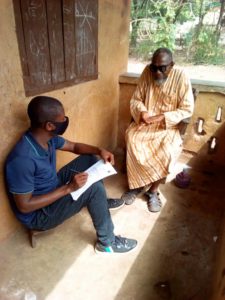Until recently, it was difficult to explain to people in high-income countries why superstition has such power in low-income societies. “Why do they still believe these things, despite all the evidence to the contrary?” some of our supporters would ask, both mystified and concerned.
Now, the Covid-19 pandemic has revealed the divide within comparatively wealthy countries between people who trust science and institutions, and those who remain suspicious of government and fact-based evidence. Trying to persuade people to alter their views often has the opposite effect, entrenching attitudes and causing offence.
Dispelling Myths About Epilepsy & Mental Health
For this reason, Network for Africa targets trusted local leaders and health workers in the communities where we work. They are the best messengers when we seek to dispel myths about the causes of epilepsy and mental health issues. Believing in horoscopes (as many do in the Global North) can be harmless, whereas stigmatizing orphans, disabled people, the survivors of conflict or pandemics, and people suffering from anxiety can ruin lives.
Network for Africa’s partner in Sierra Leone is Conforti, a respected and long-established civil society organisation. They work in schools, health centres and communities to counter superstition and prejudice. Meanwhile, they also offer support on a one-to-one and small group basis.

One of the many people they have helped is Sinnah, age 37. During the Ebola epidemic in 2015, she lost her children, her husband and her sister.
I managed to survive Ebola, though with 0% hope of any kind, Sinnah told us. Then I came across someone from Conforti who started telling me stories of people who encountered difficult situations like mine. All these years I have felt powerless, but with their talking and support I took up the responsibility to do some small-scale farming so that I can start to help myself. And now through the support of Conforti I am able to say that they have reinstated my life by up to 80%.
Although Sierra Leone is ranked among the world’s poorest countries by the UN Human Development Index (182 out of 189 nations surveyed), some government services are available. Part of our work is to make people aware that help exists and that they are entitled to it, and to support them in accessing it.
Spreading The Word
Each element of our work – community education, supporting health workers, individual and group counselling, supporting self-help groups and initiatives, and connecting people to available services – would be less effective if it happened in isolation. Call this the holistic approach, or just common sense, but it delivers results and helps transform lives.
Please click the button below to help us to continue our work in Sierra Leone, Uganda and Rwanda. The need is great, but so are the possibilities. Thank you.
TO DONATE TO N4A, PLEASE CLICK HERE